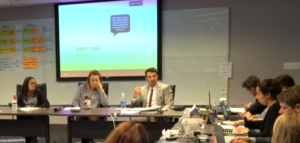
The Family & Medical Leave Insurance Task Force meeting on November 12, 2019.
The Family & Medical Leave Insurance (FAMLI) Task Force met on Tuesday, November 12th, to continue its work towards making recommendations on a program pursuant to SB 188 ahead of the 2020 Legislative Session.
The Task Force is currently awaiting an actuarial analysis to price out what a program will cost under different parameters. The study should be complete next month, and many of the Task Force’s critical decisions will rely on the results of this analysis.
In the meantime, this week Task Force members heard from two experts with significant experience implementing leave programs in other states. One notable presentation came from Joshua Seidman, and attorney with Seyfarth Shaw, LLP. Seldman provided testimony on the potential impact of a family and medical leave program for Colorado employers based on his experience in helping employers navigate existing paid family & medical leave programs and how to integrate those programs with existing employer policies, practices, and other relevant laws.
Seldman discussed many of the policy areas that the Task Force has been tackling and ways to balance the needs of employers and workers including:
- Purpose of leave
- Family Member definition
- Self-Employed Worker Access to paid family leave benefits
- Employee Eligibility Standards
- Job Protection
- Duration of Leave
- Intermittent Leave
- Interaction of the State paid leave program with other benefits, including (a) offsetting costs, (b) concurrent use, and (c) private plan exemptions
- Treatment of Small Employers
- Program Funding Structure
- Solvency
The FAMLI Task Force on Tuesday also discussed and voted on initial policy recommendations that are not dependent on the actuarial study.
One of the major topics addressed in the meeting was job protection and how long an individual should be required to work for an employer before being able to take leave under a family and medical leave program. Several Task Force members from the business community argued that this parameter should mirror the federal Family and Medical Leave Act (FMLA), which sets the standard at 1,250 days. Ultimately, however, the majority of the Task Force voted to set the standard at 120 days.
Task Force members also discussed whether to recommend a state-run program versus simply an employer mandate, which would set minimum standards businesses must meet in offering family and medical leave to employees. Several members expressed concerns that an employer mandate would lead to discrimination in hiring, and ultimately the Task Force voted 9-3 for a state-administered model.
The Task Force also determined in a 7-6 vote that any program should be 100% funded by employees, a significant departure from the FAMLI program proposed in the 2019 legislative session that split the cost 50/50 between employers and employees.
Once the actuarial analysis is complete next month, the Task Force will make final recommendations that will be included in a report to the Legislature and governor by January 2020. Recommendations that are not unanimous will include minority opinions.
